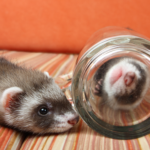A Ferret Health Guide is essential for ensuring your pet stays energetic, playful, and happy. Keeping ferrets healthy requires proper care, regular vet checkups, and a well-balanced lifestyle. Unlike dogs or cats, ferrets have unique health needs, including specialized diets, vaccination requirements, and susceptibility to certain illnesses.
In this guide, we’ll cover everything you need to know about keeping your ferret in top condition, from preventative care and common health issues to grooming, diet, and exercise. Whether you’re a new ferret owner or an experienced one looking to refine your care routine, this comprehensive resource will help ensure your little companion stays happy and thriving.

Understanding a Ferret’s Basic Health Needs – A Ferret Health Guide
The Importance of Routine Veterinary Care
A key part of any Ferret Health Guide is regular veterinary checkups to prevent serious health issues. Unlike cats and dogs, ferrets are experts at hiding illness, meaning health problems can go unnoticed until they become serious. Annual checkups allow a veterinarian to monitor your ferret’s weight, dental health, and overall condition, catching potential issues early. For senior ferrets (around five years and older), biannual vet visits are recommended since older ferrets are more prone to diseases like adrenal disease and insulinoma.
But not every vet is familiar with ferrets. To find a ferret-savvy veterinarian, look for one who specializes in exotic pets or has extensive experience treating ferrets. You can start by checking online reviews, asking local pet communities, or visiting veterinary associations like the American Ferret Association (AFA). A good ferret vet will understand their unique physiology, offer correct vaccination schedules, and provide treatment tailored to their needs.
Wondering when to take your ferret to the vet outside of regular checkups? Keep an eye out for unusual lethargy, sudden weight loss, loss of appetite, difficulty breathing, or changes in stool. Ferrets are small animals, and even minor symptoms can escalate quickly. If you notice seizures, excessive scratching, persistent diarrhea, or vomiting, don’t wait—seek emergency care immediately. Staying proactive with vet visits is one of the best ways to ensure your ferret lives a long, healthy life.
Ferret-Specific Health Risks
Ferrets are unique pets with specific health vulnerabilities that require specialized care. Unlike cats and dogs, ferrets are prone to certain conditions that can develop over time, including adrenal disease, insulinoma, and gastrointestinal blockages. Many of these health issues have subtle symptoms at first, making early detection crucial.
One of the biggest risks for ferrets is adrenal disease, a condition where the adrenal glands overproduce hormones, leading to hair loss, itchy skin, swollen vulva (in females), or increased aggression. Another common issue is insulinoma, a pancreatic tumor that causes low blood sugar. Symptoms include weakness, drooling, wobbliness, or even seizures. Since these diseases can be life-threatening if untreated, regular vet visits and monitoring your ferret’s behavior are essential.
Ferrets also face genetic health challenges, especially due to irresponsible breeding practices. Some ferrets, particularly those from large-scale pet stores, may suffer from hereditary issues like heart disease or poor immune system function. To reduce the risk of genetic health problems, it’s best to adopt ferrets from reputable breeders or rescue organizations that prioritize the long-term health of their animals rather than just mass production.
Being aware of these ferret-specific health risks allows you to act fast when symptoms appear, ensuring your ferret gets the proper care they need. With preventative measures, a balanced diet, and regular vet checkups, you can help your ferret live a longer, happier life.
Boredom and lack of exercise can contribute to health issues. Find out how to keep your ferret active in our Ferret Enrichment Guide.
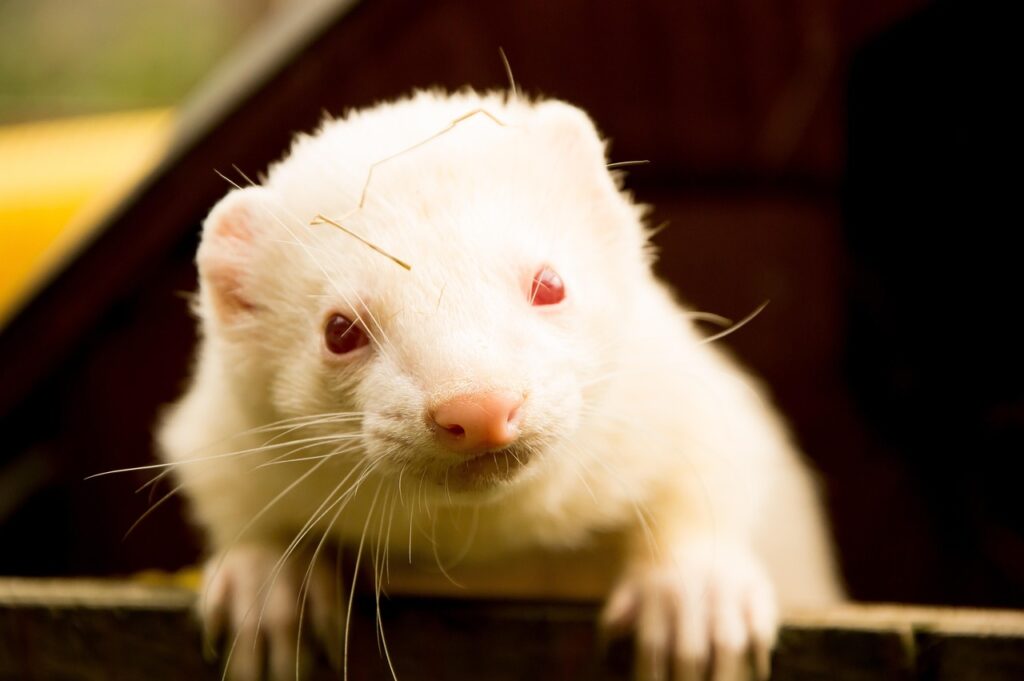
Ferret Health Guide: Common Health Issues & Prevention
Adrenal Disease in Ferrets
Adrenal disease is one of the most common and concerning health conditions in ferrets, affecting the adrenal glands and leading to hormonal imbalances. The primary causes of adrenal disease are genetics, early neutering, and unnatural light exposure. Ferrets that are spayed or neutered at a young age—especially those from large pet stores—are at a higher risk of developing this condition later in life. Symptoms start subtly but progress over time. The most common early warning sign is hair loss, typically beginning at the tail and gradually moving up the body. Other symptoms include itchy skin, swollen vulva in females, increased aggression, and excessive grooming. In severe cases, ferrets may develop muscle wasting, difficulty urinating, or lethargy.
Treatment options vary based on severity. Surgery to remove affected adrenal glands can be an effective solution but comes with risks. Many owners opt for medical management using drugs like Deslorelin (Suprelorin) implants or Lupron injections, which help regulate hormone levels and reduce symptoms. The best way to reduce the risk of adrenal disease is to provide a natural light-dark cycle, avoid early neutering when possible, and schedule regular vet checkups. Catching adrenal disease early can significantly improve a ferret’s quality of life and longevity.
Insulinoma – Blood Sugar Issues in Ferrets
Insulinoma is another serious but common health condition in ferrets, affecting the pancreas and causing low blood sugar (hypoglycemia). This disease occurs when small tumors in the pancreas produce excess insulin, leading to dangerously low glucose levels. Insulinoma is more common in older ferrets but can develop at any age. Symptoms to watch for include lethargy, drooling, pawing at the mouth, weakness, and uncoordinated movement (stumbling or wobbling). In more advanced cases, ferrets may experience seizures, temporary unconsciousness, or sudden collapses.
While insulinoma cannot be completely cured, it can be managed with medication and dietary changes. Vets often prescribe Prednisolone or Diazoxide, which help stabilize blood sugar levels. A proper diet is also crucial—ferrets with insulinoma should eat high-protein, low-carb meals frequently throughout the day to maintain stable glucose levels. Avoid sugary treats or fruit, as these can cause dangerous blood sugar spikes and crashes. Regular vet checkups are essential for early detection, and owners should be prepared to monitor their ferret’s behavior daily for any signs of distress.
Gastrointestinal Issues & Blockages
Ferrets are naturally curious and love to chew on anything they can get their paws on. Unfortunately, this makes them highly prone to gastrointestinal blockages, which can be life-threatening. Unlike dogs and cats, ferrets have a short digestive tract, meaning blockages can cause severe issues in a short amount of time. The most common causes of obstructions are swallowing foreign objects, such as rubber, foam, plastic, cloth, or even pieces of their own bedding.
Recognizing digestive distress early is key. Symptoms of a blockage include lack of appetite, vomiting, diarrhea (or no bowel movements at all), bloating, and lethargy. If you notice these signs, seek veterinary care immediately—delaying treatment can be fatal. Prevention is the best strategy. Always ferret-proof your home by removing rubber bands, hair ties, small plastic pieces, and foam objects. Provide plenty of safe, digestible chew toys and monitor your ferret’s playtime closely. If you suspect your ferret may have swallowed something dangerous, don’t wait—visit the vet as soon as possible to prevent complications.
Ferret Dental Health
According to our Ferret Health Guide, dental care is a crucial but often overlooked aspect of overall ferret wellness. Unlike wild ferrets that chew raw bones, domesticated ferrets are often fed kibble, which doesn’t clean their teeth as effectively. Over time, plaque hardens into tartar, leading to gingivitis (gum inflammation), bad breath, and tooth decay.
To prevent dental disease, daily or weekly brushing is recommended using a soft-bristled pet toothbrush and ferret-safe toothpaste (never use human toothpaste, as it contains toxic fluoride). Offering raw bones or specialized dental chews can also help reduce plaque. Regular vet checkups should include dental exams, and if your ferret shows signs of pain while eating, excessive drooling, or red/swollen gums, professional cleaning may be necessary. Keeping your ferret’s teeth in good shape ensures a pain-free, healthy life and reduces the risk of infections spreading to other organs.
Parasites & Skin Conditions
Ferrets may be small, but they can still suffer from external parasites like fleas, ear mites, and ticks. While flea infestations are less common in indoor ferrets, they can still catch fleas from other pets or used bedding. Symptoms of fleas include excessive scratching, red skin, and tiny black specks (flea dirt) in the fur. Ear mites, on the other hand, cause thick, dark wax buildup and constant head shaking. If left untreated, these parasites can lead to secondary infections. According to this Ferret Health Guide, staying proactive with parasite prevention is key to maintaining your ferret’s overall well-being.
The best way to prevent parasites is through routine grooming and vet-recommended treatments. Flea prevention medications made for cats (such as Revolution or Advantage) are safe for ferrets but should always be used under a vet’s guidance. Regular ear cleaning with a pet-safe solution can help keep mites at bay. If you suspect a serious infestation, consult a vet for treatment options.
Beyond parasites, ferrets are also prone to skin conditions like dryness, allergic reactions, and bacterial infections. A poor diet, overbathing, or underlying illnesses like adrenal disease can cause fur thinning or flaky skin. To keep your ferret’s skin healthy, avoid bathing too often, feed a high-quality protein diet, and use ferret-safe shampoos when necessary. If skin irritation persists, a vet visit is crucial to rule out underlying conditions.
Some ferret breeds and colors, such as albino and blaze-patterned ferrets, are more prone to certain conditions. Discover more in our Ferret Breeds and Colors Guide.

Nutrition & Diet – The Foundation of Ferret Wellness
What Should a Healthy Ferret Diet Include?
A ferret’s diet plays a huge role in their overall health, energy levels, and longevity. Unlike omnivores like dogs or humans, ferrets are obligate carnivores, meaning their bodies are designed to thrive on a high-protein, high-fat, and low-carbohydrate diet. Protein is essential for muscle maintenance, while fat provides the primary energy source ferrets need to fuel their endless curiosity and playfulness.
Since their digestive systems are short and fast, ferrets cannot properly process fiber, grains, or vegetables. Feeding them inappropriate foods like fruits, dairy, or starchy fillers can lead to serious digestive issues, weight gain, and even long-term health problems like insulinoma (a common pancreatic disease in ferrets). Instead, ferrets should consume high-quality animal-based protein, such as chicken, turkey, lamb, or beef. Some owners also feed raw diets, which mimic what ferrets would eat in the wild, though this requires careful nutritional balance.
A healthy ferret diet, as outlined in this Ferret Health Guide, should be grain-free, high in animal-based protein, and free from artificial additives or sugars. Providing the right food ensures strong muscles, a shiny coat, and a happy, active pet.
Choosing the Right Ferret Food
When it comes to feeding your ferret, quality matters more than convenience. The two main dietary options are high-quality ferret kibble or a raw diet, each with its own pros and cons. Ferret-specific kibble is the most convenient and widely used option, but not all brands are created equal. Look for kibble with at least 35-40% animal-based protein and 18-22% fat, with real meat listed as the first ingredient. Avoid fillers like corn, wheat, soy, or peas, as these can cause digestive issues and blood sugar imbalances over time.
A raw diet, on the other hand, is closer to what ferrets would eat in the wild and consists of raw meats, bones, and organs. While raw feeding can be incredibly nutritious, it requires careful meal planning to ensure ferrets get the right balance of protein, fat, vitamins, and minerals. Raw diets also come with risks, such as bacterial contamination if not handled properly.
Some owners consider homemade ferret diets, but this should only be done under the guidance of a veterinarian or exotic animal nutritionist. Ferrets have very specific dietary needs, and an unbalanced homemade diet can lead to severe nutritional deficiencies. Choosing the right ferret food is about finding the best balance between convenience, nutrition, and your ferret’s individual needs.
Feeding Schedule & Meal Portions
Ferrets have fast metabolisms, meaning they burn energy quickly and need to eat frequently throughout the day. Unlike dogs or cats that can eat one or two large meals, ferrets require multiple small meals to maintain their energy levels and prevent blood sugar crashes. Most ferret owners either free-feed high-quality kibble or provide scheduled meals every 3-4 hours.
Portion control is essential for maintaining a healthy weight. While ferrets rarely overeat, feeding low-quality food with too many fillers can lead to weight gain and health issues. If feeding kibble, ensure it’s high in protein and low in carbohydrates to prevent obesity and digestive problems. For raw feeders, portion sizes depend on the ferret’s age, activity level, and metabolism, but a typical adult ferret consumes 2-4 ounces of raw meat per day.
While free-feeding kibble is a practical option, especially for busy owners, it’s crucial to monitor your ferret’s weight and eating habits. Some ferrets may hoard food, which can lead to spoiled kibble hiding in corners. If your ferret gains excessive weight, adjust their portion sizes and encourage more playtime. A well-balanced feeding routine ensures optimal health, steady energy levels, and a happy, thriving ferret.
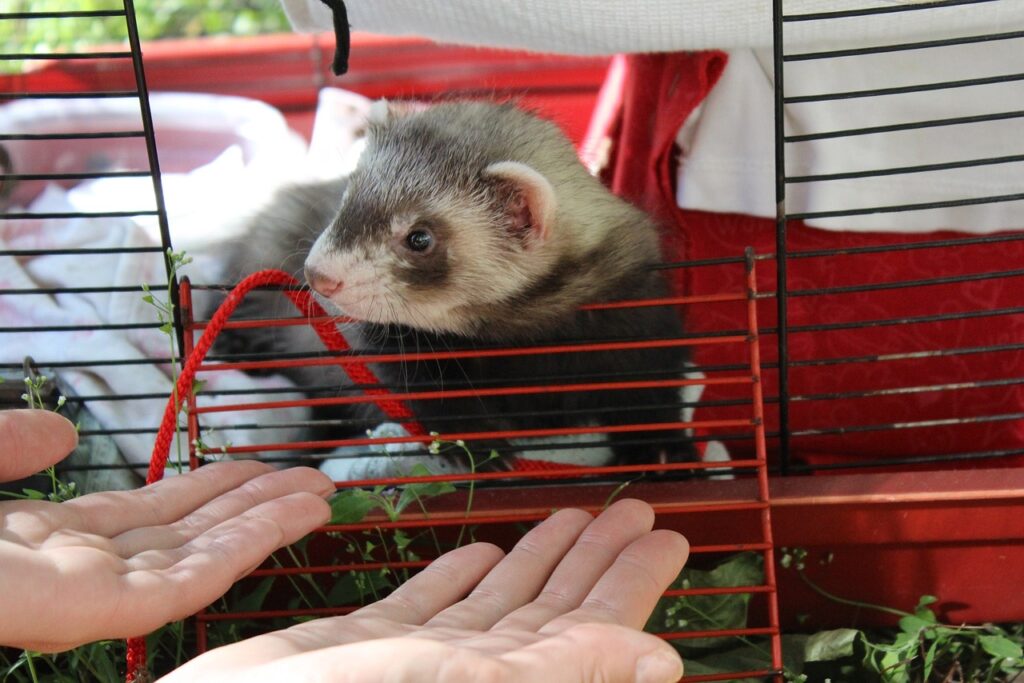
Exercise & Mental Stimulation for a Healthy Ferret
Why Ferrets Need Daily Exercise
Ferrets may be small, but they have big energy levels and require plenty of exercise to stay healthy. Ideally, ferrets should get at least 3-4 hours of supervised playtime outside of their cage every day. Unlike some pets that can entertain themselves for long periods, ferrets crave interaction and need structured activities to stay engaged. Without enough movement, they can become bored, overweight, or even depressed. A sedentary lifestyle can lead to muscle weakness, obesity, and behavioral problems, making daily exercise a must for their overall well-being.
To keep your ferret active, engage them in fun, interactive games that encourage movement. Tunnel chases, hide-and-seek, and ball pits are great ways to get them running and jumping. Many ferrets love interactive toys, such as puzzle feeders or treat-dispensing balls that challenge their minds while keeping them physically engaged. Climbing structures, ramps, and digging boxes can also add variety to their play routine. The key is to rotate activities and introduce new challenges to prevent boredom. With enough exercise and stimulation, your ferret will stay happy, fit, and full of energy.
Creating a Safe & Stimulating Environment
Ferrets are natural explorers, so creating an engaging and secure play area is crucial for their mental and physical health. One of the best ways to enrich their environment is by setting up tunnels, climbing structures, and designated play zones. Ferrets love to burrow and squeeze into tight spaces, so providing plastic tunnels, cardboard boxes, and crinkle tubes can mimic their natural instincts and keep them entertained for hours. Multi-level ferret-friendly playpens or shelving units allow them to climb, jump, and explore safely. As recommended in this Ferret Health Guide, interactive and mentally stimulating environments are essential for keeping ferrets happy and preventing boredom-related behaviors.
Looking for budget-friendly enrichment? DIY toys are a great way to stimulate your ferret without breaking the bank. Try filling a large bin with rice or crumpled paper for a digging box, or cut holes in an old shoebox to create an interactive hideout. Sock-filled tunnels, ball pits, and paper towel rolls can also serve as engaging, low-cost play options. Just make sure all toys are ferret-safe, free of small parts, and non-toxic.
For those who want to introduce outdoor exploration, safety should be a top priority. Use a secure ferret harness and leash to prevent escapes, and always supervise their outdoor time. Avoid areas with pesticides, toxic plants, or large predators that could pose a danger. With the right setup, your ferret can enjoy a stimulating, exciting environment that keeps them both physically and mentally engaged.

Grooming & Hygiene – Essential Ferret Health Care for a Happy Ferret
Bathing Your Ferret – How Often is Too Often?
Many new ferret owners assume that frequent baths will keep their pet’s natural musky scent under control. However, overbathing can do more harm than good. Ferrets have special oils in their skin that help maintain a healthy coat and regulate their scent. Bathing too often strips these oils, leading to dry, itchy skin and actually making the musky odor worse as their bodies overcompensate by producing more oil. For most ferrets, a bath every 1-2 months is more than enough—unless they roll in something dirty or smelly. As highlighted in this Ferret Health Guide, proper grooming practices help maintain a ferret’s natural coat health without excessive bathing.
When bath time is necessary, choosing the right ferret-friendly shampoo is crucial. Look for a mild, sulfate-free formula specifically designed for ferrets or small animals. Avoid shampoos meant for dogs or humans, as these can be too harsh and irritate your ferret’s sensitive skin.
For a stress-free ferret bath, follow these steps:
- Use lukewarm water in a shallow sink or tub—ferrets get cold easily.
- Gently lather shampoo on their fur, avoiding their face and ears.
- Rinse thoroughly to remove all shampoo residue.
- Towel dry immediately, then use a low-heat blow dryer if necessary.
- Offer treats and praise to make bath time a positive experience.
Nail Trimming & Ear Cleaning
Ferrets are active climbers and diggers, so keeping their nails at a proper length is essential for preventing painful snags or injuries. Overgrown nails can break, curve into their paw pads, or get caught in bedding, causing discomfort and even infections. To safely trim your ferret’s nails, use small pet nail clippers and trim just the sharp tip—avoiding the pink quick (a sensitive blood vessel inside the nail). If you accidentally cut too deep, apply styptic powder to stop the bleeding. Trimming every 2-3 weeks keeps their nails at a healthy length.
Ear cleaning is equally important since ferrets are prone to wax buildup and ear mites. A healthy ferret’s ears should be light pink with minimal wax. If you notice dark, crusty wax, constant head shaking, or scratching, mites could be the culprit. To clean their ears, use a vet-approved ear cleaner and a cotton pad. Gently wipe the outer ear, but never insert anything deep inside. If you notice a foul smell, redness, swelling, or excessive wax, consult a vet—ear infections and mites require medical treatment.
Keeping Your Ferret’s Living Space Clean
A clean habitat is key to keeping your ferret healthy, happy, and odor-free. Because ferrets are naturally curious and playful, their cages can quickly become messy with scattered bedding, spilled food, and used litter. Establishing a daily and weekly cleaning routine will help maintain a hygienic and fresh-smelling environment.
Daily cleaning tasks include:
- Spot-cleaning the litter box (ferrets tend to use one corner).
- Wiping down food and water bowls to prevent bacteria buildup.
- Removing soiled bedding or wet spots.
Weekly deep cleaning should involve:
- Scrubbing the litter box, cage bars, and flooring with pet-safe disinfectant.
- Washing all fabric bedding and hammocks to remove odors.
- Checking for hidden food stashes (ferrets love to hoard!).
Choosing the right bedding and litter also makes a difference. Ferrets do best with recycled paper pellets or aspen shavings—avoid clay-based or clumping litter, as it can cause respiratory issues. For bedding, soft fleece or cotton hammocks provide comfort without irritating their skin.
To keep your ferret’s space smelling fresh, proper ventilation, frequent washing of bedding, and using an air purifier can help control odors. A well-maintained cage not only keeps your home smelling clean but also ensures a healthier, more comfortable environment for your ferret.
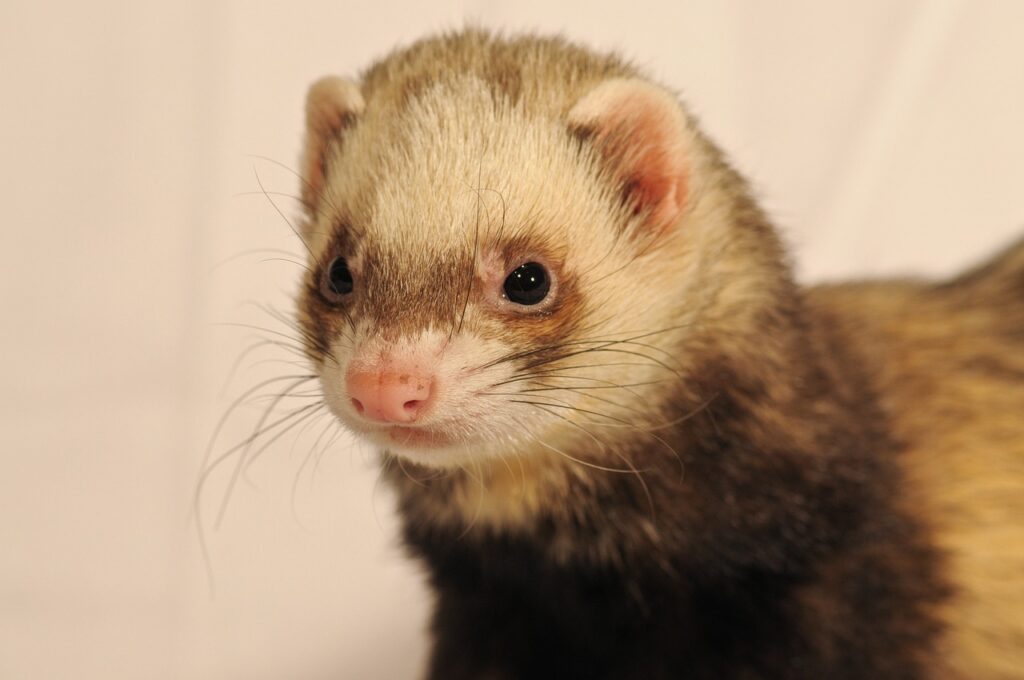
Preventative Health Care & Vaccinations
Core Vaccinations for Ferrets
Vaccinations are a crucial part of preventative healthcare for ferrets, protecting them from deadly and highly contagious diseases. Two essential vaccines every ferret should receive are the rabies vaccine and the canine distemper vaccine. Rabies is a fatal viral disease that can be transmitted to humans and other animals through bites, making vaccination not only a health necessity but also a legal requirement in many places. Canine distemper, on the other hand, is a 100% fatal disease in ferrets, causing symptoms like fever, nasal discharge, neurological damage, and ultimately death. Even indoor ferrets are at risk, as the virus can be carried in on shoes, clothing, or other pets. Following a Ferret Health Guide can help ensure you stay on top of vaccination schedules and other critical aspects of your ferret’s well-being.
Newly adopted ferrets may have unknown health histories. Learn what to look for in our Ferret Adoption and Care Guide.
Ferret vaccination schedules begin early in life. Kits (baby ferrets) should receive their first distemper vaccine at 6-8 weeks old, followed by booster shots at 10-12 weeks and again at 14-16 weeks. After that, a yearly booster is required to maintain immunity. The rabies vaccine is first given at 12-16 weeks of age, with annual boosters recommended thereafter.
While vaccines are generally safe, some ferrets may experience mild side effects like lethargy, swelling at the injection site, or a slight fever. In rare cases, ferrets may have an allergic reaction, which can include vomiting, difficulty breathing, or swelling of the face. To be safe, it’s always best to monitor your ferret for 30-60 minutes after vaccination and report any severe reactions to your vet. Keeping your ferret up to date on vaccinations is one of the simplest ways to ensure a long, healthy life.
Good overall care plays a major role in keeping your ferret healthy. Learn essential care routines in our Ultimate Ferret Care Guide.
Spaying & Neutering – Why It’s Important
Spaying and neutering ferrets is not just about population control—it’s a critical health decision that can prevent life-threatening conditions and improve behavior. In female ferrets (jills), failing to spay can lead to a condition called persistent estrus, where they stay in heat indefinitely. This results in dangerously high estrogen levels, which can cause bone marrow suppression, anemia, and even death if untreated. Spaying eliminates this risk entirely and also prevents uterine infections and ovarian cancers.
For male ferrets (hobs), neutering helps reduce aggressive behaviors, such as excessive mounting and territorial marking. It also lowers the risk of testicular cancer and helps control their strong musky odor, making them more manageable as pets. While neutering reduces hormonal aggression, it’s important to note that it does not completely eliminate playful nipping or dominance behaviors, which should still be managed with proper training.
The best age to spay or neuter a ferret is around 4-6 months old, before sexual maturity. However, many pet store ferrets are already sterilized at a young age, usually around 6 weeks old. While early sterilization prevents reproductive health risks, it may contribute to a higher chance of adrenal disease later in life due to hormone imbalances. For those adopting from breeders or rescues, discussing the timing of the procedure with an experienced veterinarian is key to ensuring the best long-term health outcomes for your ferret.
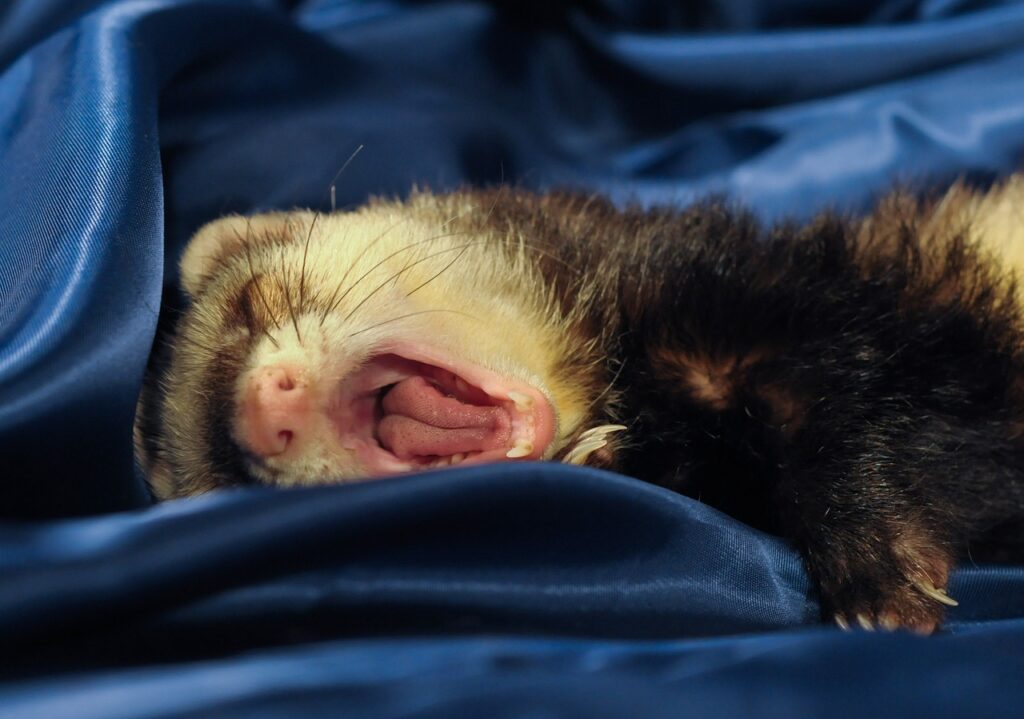
Recognizing When Your Ferret Is Sick – A Ferret Health Guide
Early Warning Signs of Illness
Ferrets are masters at hiding illness, making it crucial for owners to recognize subtle behavioral changes that could indicate a health issue. If your normally playful and energetic ferret suddenly becomes withdrawn, sleeps more than usual, or loses interest in toys and human interaction, something may be wrong. Behavioral shifts like excessive aggression, unusual clinginess, or excessive scratching can also signal underlying discomfort or illness.
Changes in appetite and weight are major red flags. A healthy ferret eats frequently, so a sudden refusal to eat or a noticeable decrease in food intake could indicate digestive issues, dental pain, or even insulinoma (a common pancreatic disease in ferrets). Rapid weight loss is particularly concerning and should never be ignored. Similarly, unexplained weight gain or bloating may suggest issues like gastrointestinal blockages or adrenal disease.
More severe symptoms such as lethargy, difficulty breathing, persistent diarrhea, vomiting, or seizures require immediate veterinary attention. Labored breathing—especially with wheezing or coughing—can indicate respiratory infections or heart disease. If you notice your ferret hunched over, shivering, or struggling to move, don’t wait. Ferrets deteriorate quickly when sick, so early intervention is key to ensuring a full recovery.
How to Perform a Basic Health Check at Home
Keeping a close eye on your ferret’s health starts with regular at-home checkups. A simple weekly health check can help catch potential problems before they become serious. As recommended in this Ferret Health Guide, start by examining their coat, eyes, and gums. A healthy ferret’s fur should be soft, full, and free from bald patches—hair loss can be an early sign of adrenal disease. Their eyes should be bright and clear, with no excessive discharge or squinting. Pale or inflamed gums could indicate anemia, dehydration, or dental issues.
Next, check their hydration levels and body condition. You can do a quick skin pinch test by gently pulling up the scruff of their neck—if the skin takes more than a second to return to normal, your ferret may be dehydrated. Also, feel along their ribs and spine; a sudden drop in weight or a bloated belly could indicate an underlying health issue.
Finally, keep track of any unusual symptoms by maintaining a health log. If you notice repeated vomiting, diarrhea, coughing, or signs of pain, write down when the symptoms started and how frequently they occur. This information can be extremely valuable for your vet in diagnosing the issue accurately. Regular home checks, combined with annual vet visits, ensure that your ferret stays happy, healthy, and full of life.
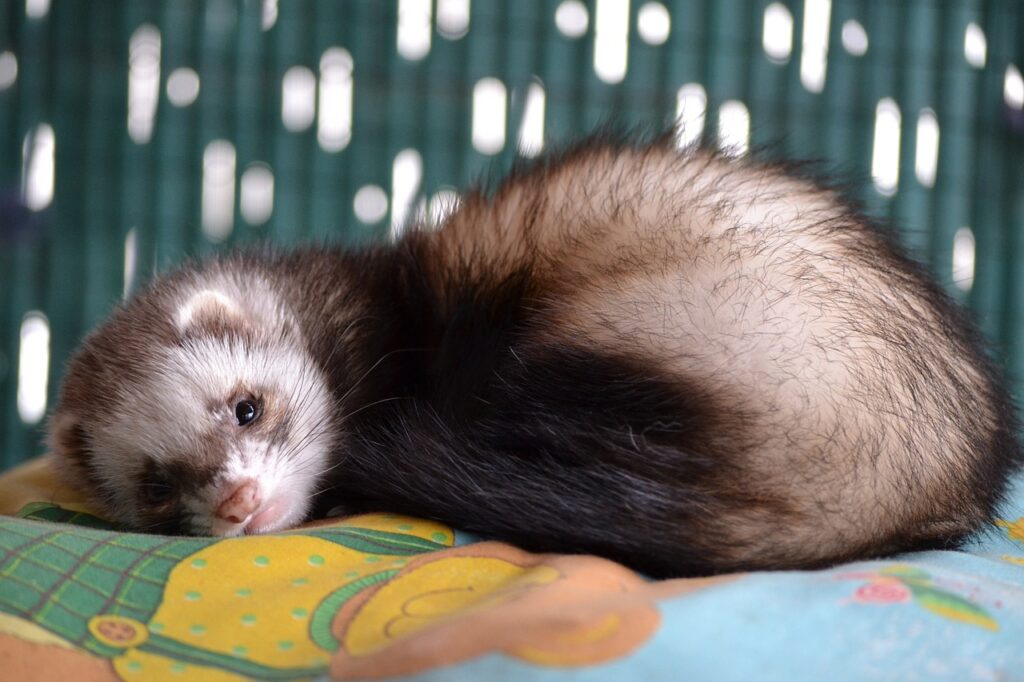
Senior Ferret Health Care – Supporting Aging Ferrets
How Ferret Health Changes with Age
Just like humans, ferrets go through noticeable physical and behavioral changes as they age. Most ferrets are considered seniors by the time they reach 4-5 years old, and by this stage, their energy levels naturally decrease. You may notice your once hyperactive ferret sleeping more, slowing down, or struggling to climb ramps and furniture. Their metabolism also changes, making proper diet and exercise even more essential to prevent obesity or muscle loss.
To accommodate their aging bodies, senior ferrets benefit from a modified diet. Instead of standard kibble, consider high-quality, easy-to-digest protein sources, such as finely chopped meat or softened kibble. If your ferret has trouble chewing, adding warm water or a meat-based broth can help. Exercise is still important, but playtime should be less intense, with gentler activities like tunnel exploration, light climbing, or interactive treat puzzles to keep their minds and bodies engaged.
Common health issues in older ferrets include adrenal disease, insulinoma, arthritis, and heart disease. Regular vet checkups every six months are crucial to catch early signs of illness. Watch for symptoms like weight loss, weakness, hair thinning, excessive thirst, or difficulty walking—all of which may indicate underlying health concerns. With proper care and adjustments, senior ferrets can continue to lead happy and fulfilling lives well into their golden years.
Comfort & Pain Management for Older Ferrets
As ferrets age, their needs shift from playfulness and adventure to comfort and support. Making small adjustments to their living environment can greatly improve their quality of life. Start by ensuring their cage and play areas are senior-friendly—replace steep ramps with gentler inclines, and provide soft bedding like fleece hammocks or memory foam mats to cushion their joints. Older ferrets may also struggle to reach elevated food and water bowls, so placing low, easily accessible dishes can make mealtime easier.
Chronic pain, especially from arthritis, is common in senior ferrets. If your ferret hesitates to climb, moves stiffly, or avoids playing, it could be a sign of joint pain. Massaging sore muscles, using vet-approved joint supplements like glucosamine, or providing warm, cozy sleeping areas can help ease discomfort. Some ferrets may require pain medication prescribed by a veterinarian, especially if arthritis progresses.
In advanced cases, when a ferret’s quality of life declines significantly—if they struggle to eat, move, or interact—it may be time to discuss palliative care options with a trusted vet. Comfort-focused care, like assisted feeding, pain relief, and ensuring a stress-free environment, can help a terminally ill ferret live out their final months with dignity and peace. Though saying goodbye is never easy, ensuring your senior ferret receives love, comfort, and the best possible care in their later years is the greatest gift you can give them.

Ferret Health Guide: Keeping Your Ferret Happy & Healthy
Caring for a ferret’s health goes beyond basic feeding and housing—it requires a proactive approach to prevent illness, provide enrichment, and maintain good hygiene. Following a Ferret Health Guide can help you stay on top of essential care routines, ensuring your ferret remains active and thriving. By staying informed and taking small daily steps, you can extend your ferret’s lifespan and improve their quality of life.
Whether you’re a new or experienced ferret owner, always prioritize routine vet care, a proper diet, and an engaging lifestyle for your little companion. A well-rounded Ferret Health Guide encourages responsible ownership, helping your ferret stay happy and healthy for years to come. A happy ferret is a healthy ferret!




